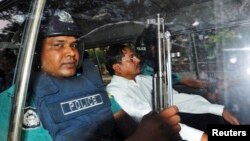In Bangladesh, the Supreme Court has upheld the death sentence of a senior Islamist politician found guilty of atrocities during the country's 1971 war of independence. It is the third guilty verdict handed down in the past week in connection with war crimes trials that some see as justice long overdue and others as a political vendetta.
A group of war veterans cheered outside the Supreme Court's doors as it upheld the death penalty awarded a year and a half ago by a special war crimes tribunal to Mohammad Kamaruzzaman. The 62-year-old, assistant secretary-general of the Jamaat-e-Islami party had been found guilty of killing dozens of civilians as he operated a pro-Pakistan militia during the bloody 1971 civil war when Bangladesh broke free of Pakistan.
The verdict came a day after another senior leader of the Jamaat-e-Islami party, Mir Quasem Ali, was found guilty of murder, abduction and torture. The business tycoon is believed to be the main financier of the party.
The third verdict this past week involved the most high profile defendant at the war crimes tribunal - the head of the Jamaat, Motiur Rahman Nizami. He was sentenced to death last Wednesday after being found guilty of genocide, torture and rape.
Tens of thousands of people had been killed during Bangladesh's independence struggle by pro-Pakistan Islamist militias.
Prosecutors say the verdicts will end the "culture of impunity."
So far, verdicts for 12 people have been handed down by the tribunal, which was set up in 2010 by Prime Minister Sheikh Hasina. All of them involve opposition politicians, a majority are from the Jamaat.
That has led critics to accuse Prime Minister Hasina of using the trials to decimate the opposition.
Ataur Rahman at Dhaka University says while there is overall public support for the guilty being brought to justice for their role in the 1971 war, there is some skepticism over the spate of capital sentences handed down.
"People in general, I would say, they are satisfied with the trial, but they are not satisfied with the verdict. Because most of the verdict came as death penalty. Death penalty in all cases looks like justice is not done. So that looks kind of orchestrated," said Ataur Rahman.
The stiff verdicts triggered violent reactions last year, killing more than 200 people in street protests. But the violence appears to have ebbed. A nationwide strike was called on Sunday, but no violence was reported.
The trials are a setback to the Jamaat - the country's largest Islamist party. However, analysts warn that even though its top leadership is in jail, or pronounced guilty of crimes, the party continues to have strong grassroots support in the country.
Amena Mohsin at Dhaka University says the verdicts will not be a major blow to the party.
"This is what had happened in 1971. There is this young leadership or generation that is coming up. Maybe this generation of this party also wants to rid itself of this guilt and appear as another party which is democratic. This is something Jamaat needed to resolve within itself," said Amena Mohsin.
While three verdicts have been handed down in quick succession this past week, many analysts believe that Sheikh Hasina's government may go slow in implementing the sentences to avoid sparking fresh unrest and more accusations of a political vendetta. She has called it a long overdue effort to obtain justice for crimes committed more than four decades ago.
